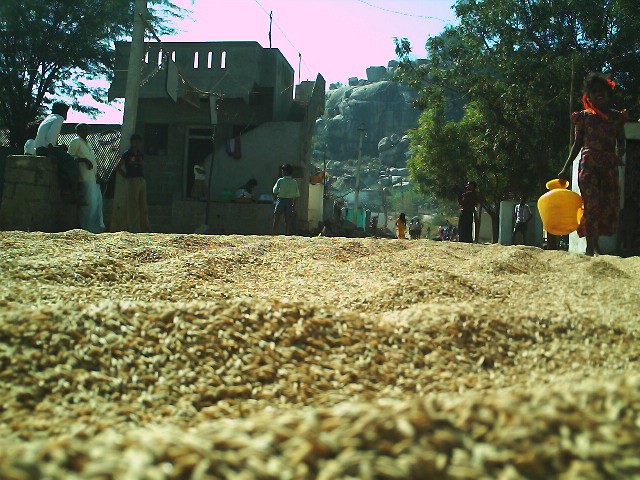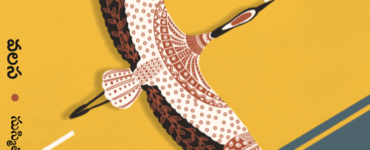The man had placed a palm on the boy’s back protectively.
The boy, soon to turn four, looked at his father perched on his folded arm. It was like sitting on a breathing bicycle rod. Slightly broader, perhaps.
They were outside a crowded shop of large bags: those that were made out of plastic white sack, generally sold near vegetable markets in Yelahanka.
The father felt the in and out breath of the boy against his palm like loose cannon waiting for a hack at the ribs.
The boy had his mother’s features, large eyes, soft cheeks, tender from the recent history of mother’s milk. Two uneven patches sat on those cheeks, the alabaster softness spoilt by rough patina of dry skin. The father wetted his palm with spit and smoothed them out.
The boy showed a bag.
The father paid 15 rupees and bought it. ‘Will mother like it?’ the little one frowned. His father smiled. ‘I’ll tell her you liked it.’
***
Parvati had been in a bad mood.
The boy developed a nasty cough and she disliked the sound of it.
The neighborly man had been eying her for some time now, pestering for favors more frequently with pleasantries and unsolicited help. It was tiring and tedious. The small, crowded neighborhood and the neighbors began to vex Parvati insidiously.
The two-room tenement in Yelahanka had opened on to a main street with two slabs raised on either side of the main door. An odd passer-by rested a load of groceries or kitchen-needs there. Parvati engaged little Vikki there in the evenings.
***
The father was in his 30s. Wiry, dark and medium-statured, he had a mop of dusty, unruly hair crowding his forehead. His brow was caught in thought. The boy’s cough bothered Parvati much. She insisted on going to the hospital, and here he was, waiting for a pending payment of 900 rupees. She asked them to buy some garlic, pepper and curry leaves to make a soup that the boy liked to eat with rice.
Not many of his colleagues bought these shimmering plastic bags, they recycled the linen ones, double stitched.
Today was different; the little boy wanted it.
***

It was five years ago that they came to Bengaluru in a state of distress and urgency.
‘… Impossible to do agriculture here…,’ the words of the school master rang in his ears.
His parents lived in a small hut with a mud floor while the wada had ‘cement’ roads, sturdy, concrete gravel smoothed over purposefully. Women dried maize and chilli on them, men carried family responsibilities with greater aplomb walking on them. He read Ambedkar when his mind was agog with questions: Who can sow any seed in an acre of land around Anantapur if it belonged to people like him? If one labored over a tomato crop spending 4000 rupees, it hardly fetched 400! He had tried growing kanakambara flowers for a year to no avail. The only pleasant sight those days was Parvati carefully picking the flowers and making a garland in the quiet of the evening. Nothing improved.
His trips to the library to read newspapers and glossy supplements that came with them brought some peace, some desire for the world. The wiser elders of the community advised his family to educate him further. But where was the money? He read poetry out loud to his friends, which some understood, some didn’t. The sobriquet Nehru soon began to float around.
His mother went to the local church and talked about theological matters among groups of women. He heard her recite the Corinthians as a little boy. Her soft voice, inflected with aspirant endings and long breaths, and the mingling smells of onion, garlic and chilli in the simmer of a stinging broth, never left his memory. It was possible to live a simple life, he believed. To simply live a life. To simply live.
His mother found Parvati, a distant relative’s daughter, for his bride. Parvati had cleared her high school in distinction. She was 19, he was 25 when they married.
As love-birds, silly and drunk on youthful arrogance, they laughed at every passing fancy that troubled them. For two years, they had taken up odd jobs, and lived in the crowded back alleys of a town closer to the village. They enjoyed a bit of toddy after festivities of any kind, and walked long distances on foot. Vikki arrived two years after the marriage.
***
Vikki smiled dearly and went into her arms when Parvati had approved of his selection.
She removed the contents of the bag and began to prepare the broth.
The boy enthusiastically cleaned the 15 x 17-inch bag, getting himself into it, and playfully marched around catching a door here, a knob there.
He pulled it over his eyes and tumbled around, arms stretched ahead of him.
Nehru counted the currency again, it was 300 short of a thousand. He looked at Parvati immersed in her chore, took out a book, laid back to make an account of his transactions.
With a thud the boy fell.
His initial muted scream led to a cough and wailing, and a rattle of complaints. His cheeks burned and his head showed a bump. Nehru ran to the nearby pharmacy as Parvati rocked Vikki in her arms with soft abuses aimed at the door and the things that harmed him. The phone rang and she mumbled something into it and switched it off, continuing with a litany of names in praise of the boy. The broth was left half cooked, and she yelled at Nehru when he returned with a prescription.
He was angry and quiet. Why were the hospitals and pharmacies filled with people? He disliked it when children shrieked in pain over injections or thermometer readings. What ailments do they have? Parvati and Nehru fought again into the night when she kept asking him to make a trip to the village- the village that he once loved and she hated, where he lacked courage to continue, his friends expected him to do great things, and he dreamt of simple pleasures of life. Parvati wanted the city, its conveniences, then. She doesn’t want them now.
He saw the billboards selling heavenly apartments at a distance, scraping the sky. He knew, from his construction site experience, how apartments scraped the sky.
That night, Parvati had dreamt about a lot of people walking on a long road, like rubber toys that Vikki asked her to buy. Her child had wilted in her hands. Her husband pulled a cart. What was there in it? Hay stacks? Or carcasses?
A riptide of illogical fear ran through her body and jolted her up. The boy had been sleeping peacefully. Last night’s powdered medicine and syrup finally helped.
She stroked him gently.
As dawn broke, the neighborly man strode past her house to catch her eye. Parvati collected Vikki’s plastic toys, a few pairs of clothes, his colorful toothbrush and pencil box and arranged them in the new bag. She packed a few tea and coffee sachets and milk powder. She saw the man make his fourth round, and swiftly reached the main door.
She pulled out a broken plastic pitcher from a corner and vigorously threw in his direction. The whole neighborhood woke up. Devotional songs on FM stations had just begun addressing the deities of the day. Terror-stricken, the man ran on his bike. The neighborhood held its breath. Many eyes scoured through the information that they did not have yet their minds volunteered to provide.
Parvati heaved heavily as Nehru pulled her inside and slapped. There were no tears. Her breath struggled through many thoughts, she rubbed the boy’s back habitually and continued to pack.
Nehru checked his own bike carefully, pushed it to the front door from a side alley. Parvati wrapped the boy in soft cloth and cushioned him between their two bodies. Nehru had started the engine and slanted his head to tell her to hold on tight. Parvati adjusted the scarf around the boy’s ears.
The neighbors knew that it was one of those precious visits to the village between tides of solace and skeptical reviews of life, pulsing across expressways between the city and its pastoral entwinements.
The white bag hung to a side of the bike with the last-minute addition of a sweetmeat packet sitting on top like a child’s tiara.
***









Well written Kiran. Great read.
Your characters are the ones we find around us, simple , unassuming but unique in their own way. Your stories and style of narration remind of R.K Narayan.. Kudos to you, Kiran for your creativity.